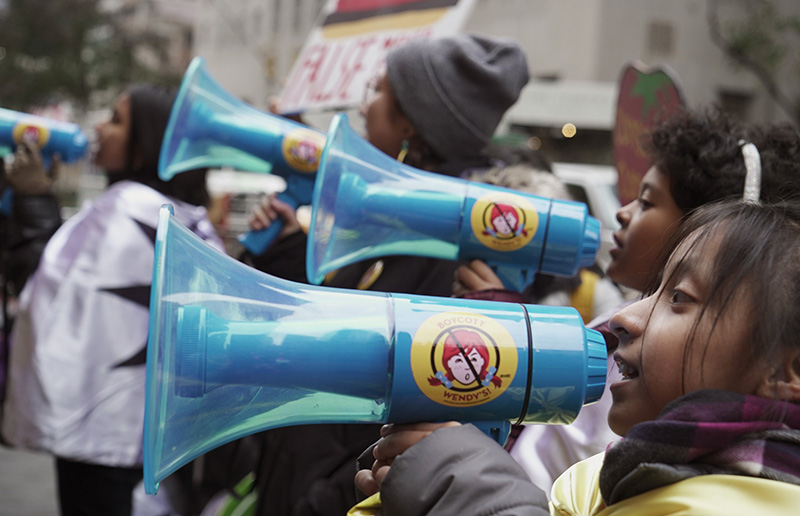
115 new monthly donors have signed up during our Summer Sustainer Drive!
48 hours left: If you become a Fair Food Sustainer in these final two days, the impact of your donation will be doubled by a matching pledge!
In 2001, as farmworkers studied their situation in Immokalee, they sought the answer to a simple question: Why are farmworkers poor? Gradually, a paradox emerged — the further away from the fields they looked, the clearer the picture became. Soon it became evident that the overwhelming economic power at the very top of the food industry, located in the consolidated fast-food and grocery chains purchasing millions of pounds of produce for thousands of stores at a time, was driving poverty and abuse for those at the bottom. Those brands leveraged their immense purchasing power to demand lower and lower prices at the farm gate, causing growers to turn to workers in the fields and offer lower and lower wages over time, just to stay afloat. In other words, as workers from Immokalee famously declared when they launched their national boycott in 2001, “Taco Bell makes farmworkers poor!”
That same analysis of the problem of farmworker poverty eventually led farmworkers in Immokalee to the solution: the consumer, the only economic actor in the food industry with more power than the multi-billion dollar brands. With the birth of the Campaign for Fair Food, the CIW sought to build an economic system designed to protect workers’ dignity, not profit from their exploitation. And if they were going to win their battle for the soul of the US food industry, they were going to have to make common cause with consumers to demand, and win, the structural changes they sought.
The Fair Food Program was born 10 years ago after years of unwavering commitment from allies like you. As a Fair Food Sustainer, you can continue to fuel the Campaign in the years ahead.
The Fair Food Program has proven that a functioning economy does not have to rest on the exploitation of those at the bottom. A different world, a different system, is possible. But we know there is a long way to go before the FFP becomes the norm for U.S. agriculture. While there are many retail partners who have helped to establish the Fair Food Program, there are far too many others who still are standing in the way of its growth.
Farmworkers’ commitment to bringing more retail partners into the Program remains as strong as it was at the launch of the campaign 20 years ago, and that commitment has been matched step-for-step by our base of consumer and student allies. Even amidst a global pandemic, farmworkers Zoomed into hundreds of classrooms across the country, musicians gathered to celebrate Fair Food in a virtual concert, faith leaders gathered for a digital summit with farmworkers, and social media continued to light up with creative campaigns, calling on holdouts like Wendy’s to join the FFP and protect essential farmworkers who were putting their lives at risk.
And in spite of the daunting limitations imposed by the pandemic, our shareholder activism hit a new high just last month: first, investors representing over $1 trillion in assets called on Wendy’s to join the Fair Food Program. Then, a resolution demanding meaningful transparency into Wendy’s supply chain practices not only made it onto the ballot of this year’s annual shareholder meeting (in spite of Wendy’s initial fierce lobbying to block it), but passed with over 95% of the vote.
Creativity and resilience have brought us this far, and with your help, they will carry Fair Food into the next decade. And as soon as it is safe, we can’t wait to see you back out on the streets!
